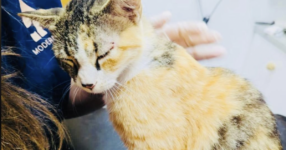
Animal lovers rush to the rescue after dozens of cats are left to die in Abu Dhabi desert
Editor’s note: This report includes images of dead animals that may cause some readers distress.
Dozens of cats were left to die in the unforgiving heat of the Abu Dhabi desert, animal rights advocates said.
The incident came to light last week when two local Emirati groups stumbled upon the helpless animals in the al-Falah area of Abu Dhabi, the capital of the United Arab Emirates, and reached out to a broader network of expatriate animal rescue volunteers for help bringing the animals to safety.
Between 30 to 40 expatriates and Emirati animal enthusiasts volunteered their time and expertise for the rescue mission. The group was able to save 94 cats and kittens. Sixty cats died.
Two dogs, a husky and a golden retriever, were also found at the scene. The husky did not survive.
The desert in the area can reach 122 degrees Fahrenheit.
Handout/CBS News
Chiku Shergill, a British management executive and an animal rights advocate who lives in Abu Dhabi and helped rescue the animals called the scene “terribly brutal.”
“I was one of the first ones to arrive on site and couldn’t imagine what I saw,” said Shergill.
Video footage showed the somber scene, which left numerous cats lifeless or buried beneath the desert’s unforgiving sands. Some of the cats were even found dead inside their unopened carriers.
Shergill said some of the cats were barely clinging to life but mustered the strength to approach her. Some were too weak to move even a few steps, she said. Shergill said she and her husband Tirth were able to scoop up the ailing felines and transport them to safety.
Nearly all of the rescued cats had been microchipped and neutered as part of trap, neuter and release programs, designed to humanely control the population of stray cats in the Emirate. The circumstances surrounding their abandonment in the desert remain unclear, but the Department of Municipalities and Transport promptly initiated an investigation “to identify the perpetrators of this inhumane act.”
Handout/CBS News
A local animal welfare advocate who spoke to CBS News on the condition of anonymity stressed the urgency of conducting a thorough investigation into the entire animal welfare system in Abu Dhabi, to identify its shortcomings and address the non-implementation of existing laws.
This evaluation should encompass the role of the government agency Tadweer, which is responsible for pest control, and the network of contractors it employs to manage stray animals, the animal welfare advocate said. These contractors are meant to transport animals to the Falcon Hospital, where they undergo health assessments and, if deemed fit, are neutered and returned to their respective communities.
“Incidents like this happened before. There’s a pressing need for comprehensive systemic changes to ensure the proper implementation of the law,” the advocate said.
Meanwhile, rescuers are not giving up on the animals dumped in the desert. Some are continuing to search for any remaining felines, setting up traps further out in the desert in the hope they will capture more lucky survivors.
“I track their paw prints in the sand with flashlights and 4×4 cars until late (at) night,” said Shergill. “I’m there daily, searching for survivors.”





